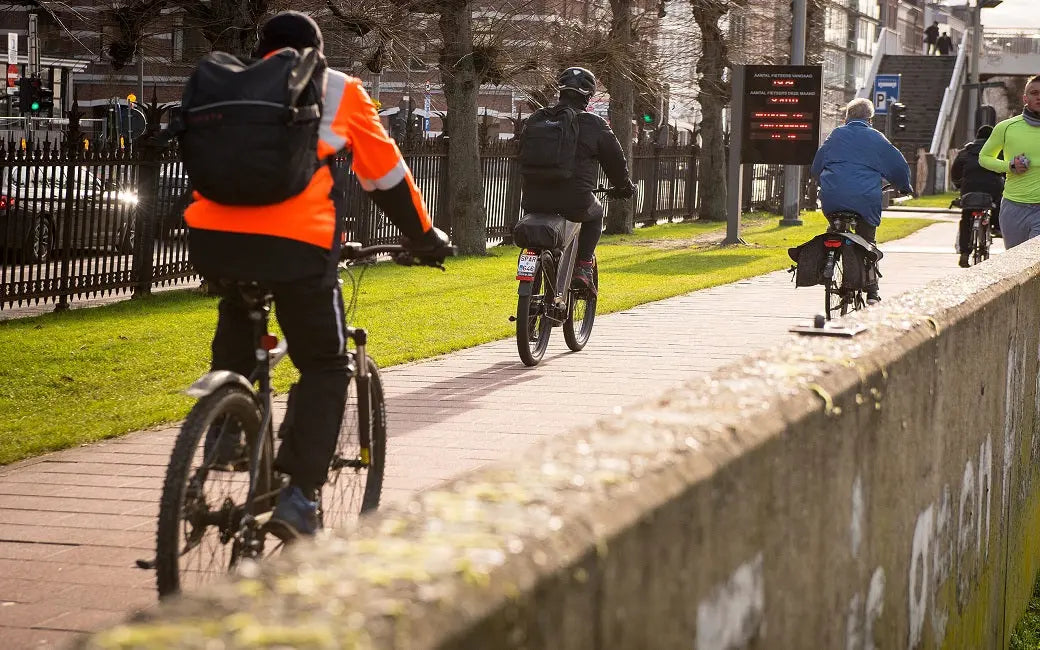
- by HOVSCO Official
What Is the Difference Between Throttle and Pedal-Assist for E-Bikes?
- by HOVSCO Official
Throttle and pedal-assist are two main ways to control an e-bike’s motor. Pedal-assist requires pedaling to activate the motor, providing power proportional to your effort, while throttle lets you power the bike instantly without pedaling, like a motorcycle. Pedal-assist gives a natural, exercise-friendly ride with better battery life, whereas throttle offers effortless power and quick starts, ideal for convenience and reduced physical effort.
Pedal-assist systems activate the motor only when you pedal, using sensors to measure cadence or torque and deliver proportional assistance. This approach supports exercise, conserves battery for longer rides, and provides smooth, predictable power delivery. It creates a connected cycling experience, ideal for riders seeking fitness benefits and extended range.
Throttle systems use a handlebar control—a twist or thumb lever—to power the motor without pedaling. This enables instant acceleration and effortless riding, perfect for quick starts or cruising without physical exertion. Throttle offers convenience for urban stop-and-go traffic or riders with limited mobility but generally drains battery faster and can cause less smooth power delivery.
Chart Title: Comparison of Pedal-Assist and Throttle Features
| Feature | Pedal-Assist | Throttle |
|---|---|---|
| Activation | Requires pedaling | No pedaling needed |
| Power Delivery | Proportional to pedaling effort | Full motor power instantly |
| Exercise Benefit | High | Low |
| Battery Efficiency | More efficient | Less efficient |
| Control | Smooth, natural feel | Sudden acceleration possible |
Pedal-assist typically extends battery life by supplying power only when pedaling and scaling assistance to need, enabling longer trips per charge. Throttle use constantly draws motor power regardless of pedaling, quickly depleting battery reserves. Pedal-assist rides feel more integrated and balanced, while throttle rides emphasize convenience but may feel less controlled or abrupt.
Pedal-assist suits riders wanting fitness, longer rides, hill climbing support, and overall battery efficiency. It’s ideal for fitness enthusiasts, daily commuters, and those who enjoy a traditional cycling experience with motor help. Throttle suits riders desiring easy, no-pedal cruising, quick accelerations in city traffic, or those with physical limitations needing effortless propulsion.
Many modern e-bikes feature both throttle and pedal-assist modes, offering riders flexibility to switch between exercise-focused and effortless riding. Models like those from HOVSCO integrate smooth pedal-assist levels with intuitive throttle control to maximize rider choice, efficiency, and convenience.
When choosing an e-bike system, consider your riding goals. If seeking fitness and longer battery range, prioritize pedal-assist. If needing effortless power or quick starts in urban settings, a throttle may be beneficial. Many riders prefer bikes offering both options for diverse use cases. HOVSCO produces e-bikes blending these features seamlessly with robust battery and motor systems designed for safe, efficient rides.
“HOVSCO’s engineering strives to prefect the harmony between throttle and pedal-assist, providing riders with intuitive control and adaptable performance. We emphasize delivering smooth power delivery for natural rides while retaining the instantaneous convenience of throttle when desired. This versatility supports a wide range of riding styles and ensures each journey is efficient, enjoyable, and safe.” — HOVSCO Product Development Team
Q: Can I use both throttle and pedal-assist on the same e-bike?
A: Yes, many modern e-bikes, including HOVSCO models, allow switching between throttle and pedal-assist modes.
Q: Does using the throttle drain the battery faster than pedal-assist?
A: Yes, because the throttle provides motor power regardless of pedaling, it tends to use more battery.
Q: Is pedal-assist better for exercise than throttle?
A: Absolutely, pedal-assist requires active pedaling, which promotes fitness benefits while riding.
Q: Are throttle e-bikes legal everywhere?
A: No, some regions restrict throttle e-bikes or classify them differently; always check local laws.
Q: Which mode is better for hill climbing?
A: Both can assist on hills, but pedal-assist provides power proportional to pedaling effort, offering better control, while throttle delivers instant power without pedaling.
Share:
Why Hovsco Fat Tire Electric Bikes Effortlessly Conquer Any Terrain
How to Check Electric Bike Motor and Battery Before Buying a Used Electric Bike